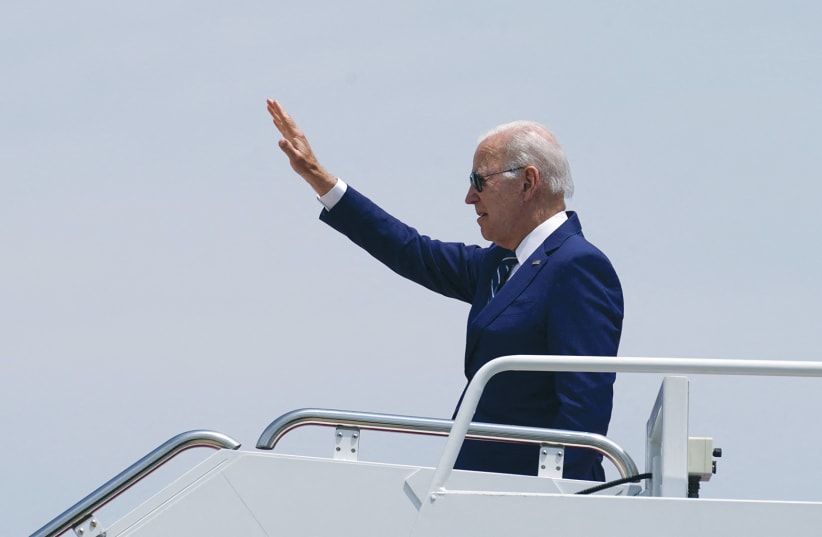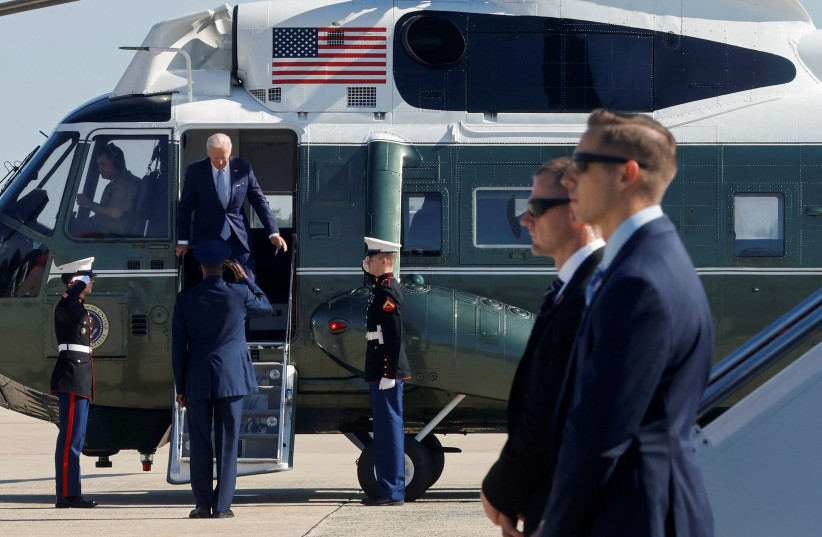Retirement is passé. Septuagenarians Sir Mick Jagger, Keith Richards and Ronnie Wood – a.k.a. The Rolling Stones – are crisscrossing Europe this summer on their 60th anniversary tour. Also hitting the road is 79-year-old President Joe Biden, who embarks on his first Middle East trip this month, since winning the US presidency. Biden will be performing before the tougher crowd, which will be watching to see whether he can summon the famed agility of Jagger in order to tease a diplomatic success out of sub-optimal conditions.
The upcoming presidential expedition to Israel, the Palestinian Authority and Saudi Arabia has tortuously evolved. Originally touted for the tail-end of official travel in June, preparations were well underway, although dates had not been announced formally, the visits were then postponed mysteriously. The delay was attributed to scheduling issues, but a more credible explanation would be the requirement of additional time for the White House to secure the deliverables that it hopes to reap from Biden’s personal involvement.
With both Biden and his Democratic party facing an uphill battle toward November’s midterms, the occasion for him to escape the toxic fray of domestic politics – and also brandish his prowess at statesmanship – has a certain charm. But the landscape of global turmoil, which has not spared the Middle East, does not provide the ideal backdrop for an already beleaguered president to come calling. There’s still a recipe, however, for Biden to squeeze lemonade out from the sour lemons in his cart. He should seize the opportunity confidently.
You can’t always get what you want
Harsh realities have conspired to thwart many of Biden’s foreign policy aspirations. His predicament is nowhere more acute than in the region from which his recent predecessors sought to disentangle the United States. To wit, circumstances are now compelling him to backpedal on his professed convictions for the purpose of salvaging America’s vital relationships in the turbulent Middle East, where the old guard is being eclipsed by a younger cohort.
Top billing on Biden’s itinerary goes to Saudi Arabia, which will play host to his most spectacular capitulation. During the 2020 campaign – after the CIA had concluded that Saudi Crown Prince Mohamad bin Salman was culpable in the murder of Washington Post columnist Jamal Khashoggi – candidate Biden declared his intent to “make [Saudi leaders] pay the price and make them, in fact, the pariah that they are.” That pledge will lie in tatters once Air Force One lands in the desert kingdom.
Critical necessities to obtain OPEC’s cooperation in tempering energy costs and to reorient American associates in the Gulf away from Moscow and Beijing have persuaded Biden that the walk to Canossa is his most tenable option. Qualms of morality, political pushback from quarters of his own party and a body-blow to his credibility will be his burden to bear.
The presidential entourage will have flown to the Gulf from Israel, the first station on Biden’s route, where his belief that “a two state solution is the only path to long-term security for Israel, while sustaining its identity as a Jewish and democratic state” will find an unreceptive audience.
With the collapse of Alternate Prime Minister Naftali Bennett’s government – which the Biden administration lauded for “showing that people with divergent backgrounds and views can come together to solve big problems” – and Israel’s descent toward its fifth ballot, Prime Minister Yair Lapid has scant bandwidth for reconciliation with the Palestinians. Biden will have to tread carefully, not pressing Israel’s overwhelmingly hawkish electorate to embrace his vision for Israel, for fear of a boomerang effect that buoys the prospects of another cycle of repeat elections or a new, hardline coalition, either of which could severely frustrate US ambitions.
Wedged between these two bookends will be a stopover in Bethlehem, where Palestinian President Mahmoud Abbas will remind Biden of his promise to “take immediate steps to... reopen the US consulate in east Jerusalem, and work to reopen the PLO mission in Washington.” That assurance remains unfulfilled to this day. The consolation prizes of an upgrade for a deputy assistant secretary of state to the status of “special envoy to the Palestinians” and the rebranding of the State Department’s Palestinian Affairs unit in Jerusalem are doubtful to entice Abbas – who has readied a list of demands for Biden – to resume moribund negotiations with Israel.
Additionally, hovering over the president’s conversations with Saudis and Israelis will be their concerns about a belligerent Iran’s drive to acquire a nuclear weapons capability and about the shortcomings of US policy in this context. Air Force One will touch down in Israel six full months after Secretary of State Antony Blinken’s pronouncement that there only “a few weeks left to see if we can get back to mutual compliance” with Iran, but Biden’s objective to reenter the agreement from which former President Donald Trump withdrew has yet to materialize. Expectations of progress from the latest set of proximity talks were exceedingly low and their failure has energized calls for the Biden administration to implement a course correction away from underachieving diplomacy.
But if you try sometimes
The task for the White House will be to accentuate the positive, as the song goes, while trying to brush the negative under the rug. In Jeddah, Saudi Arabia, Biden will highlight the reset of America’s strategic partnership with Saudi Arabia, convening with both King Salman and, reportedly, Prince Mohamad. Mutual smiles will have been guaranteed after multiple meetings of US and Saudi advance teams. Uncomfortable topics will be broached behind closed doors.
No less significant will be the president’s attendance at a high-profile GCC+3 assembly, where the king will host fellow Gulf Cooperation Council principals and the heads-of-state of Egypt, Jordan and Iraq. Biden’s presence will amplify the impact of the gathering.
In Jerusalem, Biden will emphasize the unbreakable bond between the US and Israel, which he first visited just before the Yom Kippur War and where has known every premier since Golda Meir. His meetings with Israeli leaders will be amplified by choreographed events: meeting with Holocaust survivors at Yad Vashem, IDF soldiers at the cutting-edge Iron Beam rocket interceptor and competing athletes at the Maccabiah Games. This underscores his commitment to Israel’s security and to Washington’s robust ties with the Jewish state, which Democrats and Republicans alike continue to view favorably.
A virtual I2U2 summit, seating Biden and Lapid together with Indian Prime Minister Narendra Modi and UAE President Mohammed bin Zayed Al Nahyan, will feature Israel’s integral role in the international economy.
In a nod to Palestinian claims on Jerusalem, the president is also slated to survey the city’s Augusta Victoria Hospital, a flagship of the East Jerusalem Hospital Network, to which USAID has provided millions in financial support. In Bethlehem, where he will be received by Abbas, Biden’s schedule will include time at the Church of the Nativity. Flattering optics will take the place of more tangible substance vis-à-vis the Palestinians, with no apparent horizon of reviving their dialogue with Israel.
You get what you need
What Biden lacks desperately right now and what he can display potentially in the Middle East is the gravitas to exercise his prerogatives. That cachet has diminished steadily amid impressions that the US has retired from the superpower business. A senior administration official admitted this much when he disclosed that “this visit... demonstrates, we believe, the return of American leadership to bring countries together to address common threats and challenges.” The building blocks of Biden’s itinerary can help burnish America’s credentials, constituting an important milestone on the road to a possible refurbishment of Pax Americana.
Improving the tenor of US interactions with the Saudi royals will ripple out constructively, creating stronger neighborhood alignment with Biden’s priorities. The mitigation of fallout from the Ukraine crisis on oil prices is only one piece of a complex dynamic. Saudi Arabia is a fulcrum. Its influence over the discourse in the region was illustrated late last month, when the crown prince cycled through Egypt, Jordan and Turkey, where he was greeted warmly by President Abdel Fattah al-Sisi, King Abdullah II and President Recep Tayyip Erdogan, respectively.
Members of the GCC, headquartered in Riyadh, also take cues from the Saudi monarchy. The president’s overture will promote substantial American economic and security interests in the Middle East, including the projection of US strength via its military footholds in Bahrain and Qatar, and help to extricate its capitals from the gravitational pull of Russia and China.
Biden will also be accelerating the pace of productive engagement between Israel and the Muslim world after his administration’s initially tepid support for the Abraham Accords. Contacts being brokered now by the US to expand permission for flights from Israel to travel through Saudi airspace, transfer sovereignty over Tiran and Sanafir Islands from Egypt to Saudi Arabia – a step which would require Israel’s consent – and to allow Palestinians with Israeli passports to fly directly for pilgrimages in Mecca are moving forward.
This development comes on the heels of US-sponsored face-to-face coordination between Saudi and Israeli military chiefs on strategies to combat the shared threat of Iranian missile and drone attacks. Israel’s absorption into CENTCOM’s area of responsibility, last September, has facilitated greater interoperability in the theater. What this will mean for the US is enhanced stability, fewer distractions and a more disciplined corps of capable allies.
Enlarging the scope of Israel’s normalization with its erstwhile enemies will also boost the electoral fortunes of Israel’s incumbent prime minister, with whom Biden is almost certain to find a common language. It could also bolster the chances of some future breakthrough on the Palestinian track, with Israel becoming less embattled and the Palestinians continuing to lose leverage. With tested formulas for peace having flopped or even backfired, investing in comprehensive normalization is shaping up to offer the best shot at a deal between Israelis and Palestinians.
Finally, the integrated security architecture which the US is inaugurating – with the enthusiastic participation of Israel and multiple Arab countries – represents a force multiplier that sends a clear message to Iran about the limits of its malicious interference. Biden’s orchestration of this coalition increases the visibility and preparations of a feasible Plan B that could be set in motion to curtail Iran’s acquisition of a nuclear weapon if and when all other avenues prove futile.
The Middle East is transitioning. A new generation of rulers is gradually taking the reins of power and wondering if they have a willing partner in Washington now or whether they should keep hedging their bets. Biden, whose career is more likely winding down, can answer that question most effectively by restoring US leadership on his visit to the region. In so doing, he will be elevating America’s foremost national interests and – even if he gets no satisfaction at the polls in November – cementing a cornerstone of his legacy.
The writer (@ShalomLipner), a nonresident senior fellow for Middle East Programs at the Atlantic Council, served seven consecutive Israeli premiers over a quarter-century at the Prime Minister’s Office in Jerusalem.

